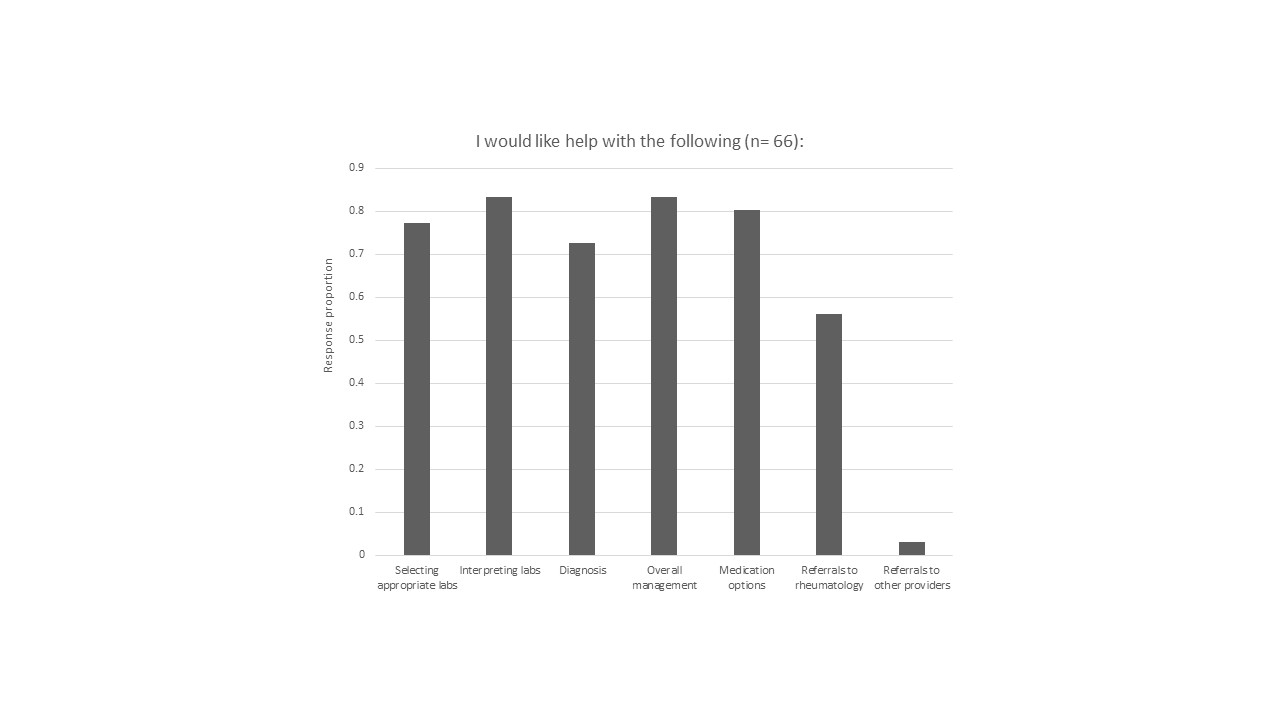Session Information
Date: Monday, November 9, 2020
Session Type: Poster Session D
Session Time: 9:00AM-11:00AM
Background/Purpose: One in 3 U.S. Veterans live with arthritis, the number one cause of disability. Despite this high prevalence, much needed care may be limited or delayed due to far distance to the nearest specialist, or even lack of specialists. There is an anticipated shortage of rheumatologists in the next 5 years in the Veterans Administration (VA). To overcome these barriers, VA adapted the Extension for Community Health Care Outcomes (ECHO) model for specialists to share expertise with primary care clinicians. Rheumatology VA-ECHO aims to improve care quality and access to care for Veterans who may not have access to a rheumatologist. Our objective was to identify gaps in knowledge and support for primary care clinicians serving rural Veterans in order to effectively expand the newly established Rheumatology VA-ECHO.
Methods: Two VA rheumatologists and a clinical psychologist developed a survey to assess primary care clinician confidence in diagnosing and caring for patients with select rheumatologic conditions. Additionally, the survey asked about clinician knowledge of, experiences with, and barriers to attending rheumatology-specific VA-ECHO sessions. Primary care clinicians in the Pacific Northwest who care for at least 50 rural Veterans were eligible to participate. A total of 313 clinicians were sent a REDCap survey invitation. Responses were collected for a period of 2 weeks. Data were analyzed using descriptive statistics.
Results: A total of 69 survey responses were collected (22% response rate). Respondents had a mean age of 52 (SD= 10.5), predominantly identified as female (60%), were physicians (43%) or nurse practitioners (43%), and had been serving rural Veterans for more than 5 years (65%). Most clinicians reported feeling somewhat comfortable taking a history (58%), performing a physical exam (60%), ordering labs (53%), interpreting labs (39%), and managing follow-up care (37%) for patients with rheumatologic conditions. Clinician confidence level in diagnosing and managing rheumatologic diseases varied based on disease (Table 1). Clinicians reported being very confident in diagnosing (77%) and managing (72%) osteoarthritis which contrasted with most clinicians reported no confidence in diagnosing (54%) and managing (56%) systemic sclerosis. While more than half of the sample had heard of VA-ECHO (64%), n (88%) had never attended a VA-ECHO session and 97% reported not knowing where to find past sessions. Despite this, 72% of respondents felt that they would benefit from additional rheumatology educational resources (Figure 1).
Conclusion: Primary care clinicians caring for rural or highly rural Veterans agree that they would benefit from additional rheumatology specialty support and education around diagnosing and managing rheumatologic diseases. Despite this, few clinicians surveyed reported ever attending a Rheumatology VA-ECHO session, and even fewer knew how to locate an archived session. In order to continue to provide high quality rheumatologic care to rural Veteran populations, health systems should consider implementing organizational supports that draw awareness to and encourage use of resources such as Rheumatology VA-ECHO.
 Proportion of respondents (y-axis) who reported they would like help with the following tasks (x-axis): selecting appropriate labs, interpreting labs, diagnosis, overall management, medication options, referrals to rheumatology or other providers.
Proportion of respondents (y-axis) who reported they would like help with the following tasks (x-axis): selecting appropriate labs, interpreting labs, diagnosis, overall management, medication options, referrals to rheumatology or other providers.
To cite this abstract in AMA style:
Matsumoto R, Kahler J, Dougherty J, Bach M, Barton J. Identifying Primary Care Clinician Knowledge Gaps and Needs in Rheumatologic Care for Rural Veterans [abstract]. Arthritis Rheumatol. 2020; 72 (suppl 10). https://acrabstracts.org/abstract/identifying-primary-care-clinician-knowledge-gaps-and-needs-in-rheumatologic-care-for-rural-veterans/. Accessed .« Back to ACR Convergence 2020
ACR Meeting Abstracts - https://acrabstracts.org/abstract/identifying-primary-care-clinician-knowledge-gaps-and-needs-in-rheumatologic-care-for-rural-veterans/
